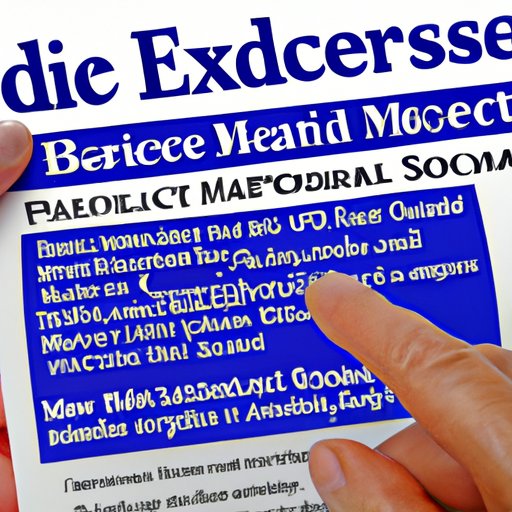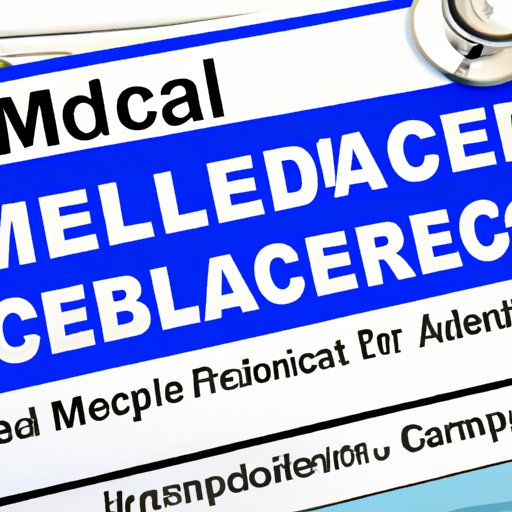Introduction
Medicare is a government health insurance program designed to provide coverage for people 65 or older, certain younger people with disabilities, and people with End-Stage Renal Disease (ESRD). It helps cover medical expenses like hospital stays, doctor visits, and prescription drugs. Knowing how to apply for Medicare can help you make sure you have access to the best coverage available.
Overview of Medicare
Medicare is divided into four parts, each of which covers different services. Part A covers inpatient hospital care, skilled nursing care, some home health care services, and hospice care. Part B covers medically necessary services like doctor visits, lab tests, and preventive care. Part C, also known as Medicare Advantage, is a combination of Parts A and B that is offered through private insurance companies. Part D covers prescription drugs.

Benefits and Costs of Medicare
Medicare provides comprehensive coverage for many healthcare services. Most services are covered at no cost to the patient. However, there are out-of-pocket costs associated with Medicare, such as copayments, coinsurance, and deductibles. There may also be monthly premiums for Part B and Part D coverage.

Eligibility Requirements for Applying for Medicare
In order to be eligible for Medicare, you must be either 65 years old or older, disabled, or have ESRD. You must also be a U.S. citizen or permanent resident. Additionally, you must have worked and paid Medicare taxes for at least 10 years.
Documentation Required
When applying for Medicare, you will need to provide proof of your age, identity, citizenship/residency status, and work history. This may include a valid driver’s license, Social Security card, passport, birth certificate, and W-2 forms.

Steps to Apply for Medicare
Once you have determined that you are eligible for Medicare, you can begin the application process. You can apply online or by mail. Both options require you to provide the same documentation mentioned above.
How to Apply Online
Applying for Medicare online is quick and easy. Visit the Medicare website and click on the “Apply for Medicare” link. You will then be asked to create an account and fill out the necessary information. Once you submit the application, you will receive a confirmation email letting you know that your application has been received.
How to Apply by Mail
You can also apply for Medicare by mail. Download the “Application for Enrollment in Medicare” form from the Medicare website and fill it out. Make sure to include all of the required documentation. Mail the completed form to the address provided on the form.
When to Start Enrollment
It is important to start the enrollment process at least three months before you turn 65. This will ensure that you are enrolled in Medicare when you become eligible.
Different Parts of Medicare Coverage
Medicare is divided into four parts, each of which covers different services. It is important to understand what each part covers so that you can make an informed decision about your coverage.
Explaining Medicare Part A
Part A covers inpatient hospital care, skilled nursing care, some home health care services, and hospice care. It also covers some short-term care in a rehabilitation facility.
Explaining Medicare Part B
Part B covers medically necessary services like doctor visits, lab tests, and preventive care. It also covers some durable medical equipment, mental health services, and outpatient prescription drugs.
Explaining Medicare Part C
Part C, also known as Medicare Advantage, is an alternative to Original Medicare (Parts A and B). It is offered through private insurance companies and typically includes additional benefits like vision, hearing, and dental coverage. It is important to note that Part C plans often come with higher premiums and out-of-pocket costs.
Explaining Medicare Part D
Part D covers prescription drugs. These plans are offered through private insurance companies and vary in cost and coverage. Many Part D plans offer additional benefits like coverage for generic drugs, mail-order services, and coverage for over-the-counter medications.
Choosing a Medicare Plan
Once you understand the different parts of Medicare, you can start comparing plans. It is important to understand your needs and compare plans based on cost, coverage, and other factors. Here are some tips for choosing a Medicare plan.
Understanding Your Needs
Before you start comparing plans, it is important to understand your healthcare needs. Make a list of the services you need coverage for and look for plans that meet those needs.
Comparing Different Plans
Once you know what services you need coverage for, you can start comparing plans. Look for plans that cover those services and compare costs, deductibles, and other features. You can use the Medicare Plan Finder tool to compare plans.
Exploring Supplemental Coverage Options
If you need additional coverage, you may want to explore supplemental coverage options. Supplemental coverage plans, such as Medigap, provide additional coverage for things like copayments, coinsurance, and deductibles. Be sure to compare plans carefully to make sure you get the coverage you need.
Enrolling in Medicare
Once you have chosen a plan, you can enroll in Medicare. Here are some tips for signing up for Medicare.
Signing Up for Medicare Parts A and B
You can sign up for Medicare Parts A and B during the initial enrollment period, which begins three months before you turn 65 and ends three months after you turn 65. During this time, you can sign up online, by phone, or by mail.
Changing Your Current Plan
If you already have a Medicare plan and want to switch to a different one, you can do so during the annual open enrollment period. This period runs from October 15 to December 7 each year. During this period, you can switch plans without penalty.
Understanding Open Enrollment
If you miss the initial enrollment period or the annual open enrollment period, you may still be able to enroll in a Medicare plan. You may qualify for a special enrollment period if you move, lose other insurance coverage, or experience a qualifying life event. Contact Medicare for more information.
Alternatives to Medicare
If you are not eligible for Medicare or if Medicare does not meet your needs, there are other options available. Here are some alternatives to Medicare.
Private Insurance Options
If you are not eligible for Medicare, you can purchase private health insurance. Private insurance plans vary in terms of cost, coverage, and other features, so be sure to compare plans carefully to find one that meets your needs.
Medicaid
Medicaid is a government-funded health insurance program for low-income individuals and families. Eligibility requirements vary by state, but generally include income, assets, and other factors. Contact your state’s Medicaid office for more information.
Long Term Care Insurance
Long term care insurance is a type of insurance that helps pay for long term care services, such as in-home care and assisted living. Premiums vary depending on the type of coverage you choose, so be sure to compare plans carefully before making a decision.
Conclusion
Applying for Medicare can be a complicated process, but it is important to make sure you have the coverage you need. Understanding the eligibility requirements, steps to apply, different parts of Medicare coverage, how to choose a plan, and how to enroll in Medicare can help ensure that you get the best coverage available. Additionally, there are alternatives to Medicare, such as private insurance, Medicaid, and long term care insurance, if Medicare does not meet your needs.
(Note: Is this article not meeting your expectations? Do you have knowledge or insights to share? Unlock new opportunities and expand your reach by joining our authors team. Click Registration to join us and share your expertise with our readers.)
